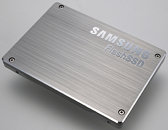- Joined
- Oct 9, 2007
- Messages
- 47,435 (7.51/day)
- Location
- Hyderabad, India
| System Name | RBMK-1000 |
|---|---|
| Processor | AMD Ryzen 7 5700G |
| Motherboard | ASUS ROG Strix B450-E Gaming |
| Cooling | DeepCool Gammax L240 V2 |
| Memory | 2x 8GB G.Skill Sniper X |
| Video Card(s) | Palit GeForce RTX 2080 SUPER GameRock |
| Storage | Western Digital Black NVMe 512GB |
| Display(s) | BenQ 1440p 60 Hz 27-inch |
| Case | Corsair Carbide 100R |
| Audio Device(s) | ASUS SupremeFX S1220A |
| Power Supply | Cooler Master MWE Gold 650W |
| Mouse | ASUS ROG Strix Impact |
| Keyboard | Gamdias Hermes E2 |
| Software | Windows 11 Pro |
Samsung Electronics Co., Ltd., the world leader in advanced memory technology, announced today that it is mass producing 100 and 200 gigabyte (GB) solid state drives (SSDs) for use as the primary storage in enterprise storage systems. "By being able to fully meet the rising demand for high-performance and eco-friendly server and storage platforms, SSDs will be able to penetrate the enterprise application market even more rapidly," said Dong-Soo Jun, executive vice president, memory marketing, Samsung Electronics. "We will continue to deliver SSD solutions with outstanding performance and low power consumption to provide optimal value for data centers and other enterprise storage environments."
The first recipient of the drive will be EMC. "EMC collaborated with Samsung to qualify Samsung's new enterprise-class SSDs for EMC's market-leading midrange storage portfolio," said Joel Schwartz, Sr. Vice President, Common Storage Platform Operations at EMC. Samsung started producing its 3.5 inch 100 and 200GB SSDs last month. Adopting SSDs as a main storage media in storage systems will minimize power consumption as well as enhance overall system performance, leading to a lowering of the total cost of ownership over time.

By using 40-nanometer-class single-level-cell (SLC) NAND flash chips and a controller that fully utilizes a 3Gb/s (gigabits per second) SATA interface, the Samsung SSDs process random read commands at 47,000 input/outputs per second (IOPS) and random writes at 29,000 IOPS, compared to a 15K RPM HDD which has an IOPS rate of 350, a 130X and 80X gain respectively in random IOPS read and write performance.
In addition, the new Samsung 200GB SSDs read data sequentially at 260 megabytes per second (MB/s) and write it sequentially at 245 MB/s, throughput that maximizes the SATA 3Gb/s interface bus speed.
Low power consumption is another key attraction for system operators adopting enterprise storage systems with SSDs. The faster operating speeds of the new 200GB enterprise SSD will further lower the power consumption of enterprise storage systems with SSDs. A 72 terabyte enterprise storage system using conventional SSDs consumes approximately 6.9 kilowatts (kWs), a 30 percent saving over an equivalent system with HDD storage which consumes 10kWs.
Also, the new Samsung SSDs have an 'end-to-end data protection' function, and advanced data encryption algorithm, to address growing reliability and security concerns in enterprise storage.
With its new SSDs, Samsung now has the industry's widest range of densities of enterprise SSD products for server and storage applications including 2.5 inch 50, 60, 100 and 120GB SSDs and 3.5 inch 100 and 200GB SSDs.
According to Gartner, worldwide SSD units and revenues for enterprise application will grow from 324K units and US$485 million in 2009 to 6.3 million units and US$3.6 billion in 2014.
View at TechPowerUp Main Site
The first recipient of the drive will be EMC. "EMC collaborated with Samsung to qualify Samsung's new enterprise-class SSDs for EMC's market-leading midrange storage portfolio," said Joel Schwartz, Sr. Vice President, Common Storage Platform Operations at EMC. Samsung started producing its 3.5 inch 100 and 200GB SSDs last month. Adopting SSDs as a main storage media in storage systems will minimize power consumption as well as enhance overall system performance, leading to a lowering of the total cost of ownership over time.

By using 40-nanometer-class single-level-cell (SLC) NAND flash chips and a controller that fully utilizes a 3Gb/s (gigabits per second) SATA interface, the Samsung SSDs process random read commands at 47,000 input/outputs per second (IOPS) and random writes at 29,000 IOPS, compared to a 15K RPM HDD which has an IOPS rate of 350, a 130X and 80X gain respectively in random IOPS read and write performance.
In addition, the new Samsung 200GB SSDs read data sequentially at 260 megabytes per second (MB/s) and write it sequentially at 245 MB/s, throughput that maximizes the SATA 3Gb/s interface bus speed.
Low power consumption is another key attraction for system operators adopting enterprise storage systems with SSDs. The faster operating speeds of the new 200GB enterprise SSD will further lower the power consumption of enterprise storage systems with SSDs. A 72 terabyte enterprise storage system using conventional SSDs consumes approximately 6.9 kilowatts (kWs), a 30 percent saving over an equivalent system with HDD storage which consumes 10kWs.
Also, the new Samsung SSDs have an 'end-to-end data protection' function, and advanced data encryption algorithm, to address growing reliability and security concerns in enterprise storage.
With its new SSDs, Samsung now has the industry's widest range of densities of enterprise SSD products for server and storage applications including 2.5 inch 50, 60, 100 and 120GB SSDs and 3.5 inch 100 and 200GB SSDs.
According to Gartner, worldwide SSD units and revenues for enterprise application will grow from 324K units and US$485 million in 2009 to 6.3 million units and US$3.6 billion in 2014.
View at TechPowerUp Main Site






